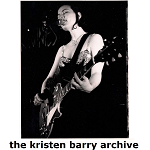Musician Magazine (December 1996): Difference between revisions
Created page with "== KRISTEN BARRY == ''by Chris Smets'' It's a familiar story: Female piano prodigy grows up to sell her soul to rock 'n' rock. But Seattle-bred singer/songwriter Kristen Barry mostly ditches her early lessons for the sweet sins of the electric guitar, an instrument she taught herself to play only four years ago. "I didn't take lessons," Barry says. "Purposely. Piano had already become this monkey on my back, because I wanted to be better at it than I was. With guitar,..." |
|||
| Line 6: | Line 6: | ||
"I didn't take lessons," Barry says. "Purposely. Piano had already become this monkey on my back, because I wanted to be better at it than I was. With guitar, I had this fresh instrument; I had no idea what I was doing, so I could do everything wrong and not be wrong. Basically, I learned guitar by taking what I heard in my head and figuring out where it was." | "I didn't take lessons," Barry says. "Purposely. Piano had already become this monkey on my back, because I wanted to be better at it than I was. With guitar, I had this fresh instrument; I had no idea what I was doing, so I could do everything wrong and not be wrong. Basically, I learned guitar by taking what I heard in my head and figuring out where it was." | ||
The result of this unconventional methodology is Barry's raw and challenging debut, ''The Beginning the Middle the End'' (Virgin). On it, her fierce, emotive playing gives the music freshness and white-hot immediacy. ''BME'' marks the latest step in a journey that has taken Barry past a teenage stint playing keyboards with a rock band, as well as a failed development deal she signed at age 21 with Epic. | The result of this unconventional methodology is Barry's raw and challenging debut, ''[[The Beginning. The Middle. The End.|The Beginning the Middle the End]]'' (Virgin). On it, her fierce, emotive playing gives the music freshness and white-hot immediacy. ''BME'' marks the latest step in a journey that has taken Barry past a teenage stint playing keyboards with a rock band, as well as a failed development deal she signed at age 21 with Epic. | ||
"They were setting me up with a lot of writers," Barry, now 26, recalls. "I was getting a lot of people's opinions about my music in such a way that what I was doing was wrong and their way was right, and I struggled with that for the next couple of years." | "They were setting me up with a lot of writers," Barry, now 26, recalls. "I was getting a lot of people's opinions about my music in such a way that what I was doing was wrong and their way was right, and I struggled with that for the next couple of years." | ||
Revision as of 21:44, 13 October 2025
KRISTEN BARRY
by Chris Smets
It's a familiar story: Female piano prodigy grows up to sell her soul to rock 'n' rock. But Seattle-bred singer/songwriter Kristen Barry mostly ditches her early lessons for the sweet sins of the electric guitar, an instrument she taught herself to play only four years ago.
"I didn't take lessons," Barry says. "Purposely. Piano had already become this monkey on my back, because I wanted to be better at it than I was. With guitar, I had this fresh instrument; I had no idea what I was doing, so I could do everything wrong and not be wrong. Basically, I learned guitar by taking what I heard in my head and figuring out where it was."
The result of this unconventional methodology is Barry's raw and challenging debut, The Beginning the Middle the End (Virgin). On it, her fierce, emotive playing gives the music freshness and white-hot immediacy. BME marks the latest step in a journey that has taken Barry past a teenage stint playing keyboards with a rock band, as well as a failed development deal she signed at age 21 with Epic.
"They were setting me up with a lot of writers," Barry, now 26, recalls. "I was getting a lot of people's opinions about my music in such a way that what I was doing was wrong and their way was right, and I struggled with that for the next couple of years."
Disillusioned, she walked away from the deal after only a year. Her exit bought her the opportunity to hone songs on her own. "When I was writing when I was 17 or 18, I was really trying to be clever, and it was so apparent to me that it was not me," she laughs. "It was kinda cute." Now, she says, "most of the [lyrical] stuff comes out raw and stays raw. I don't spend too much time over-analyzing it." Truthful and direct, she employs a fearless economy of language on BME that's rare for any songwriter. "Sometimes," she admits, "the lines that kill me when I hear a song are the simplest ones.
"Words," she muses quietly, "always screw me up."
